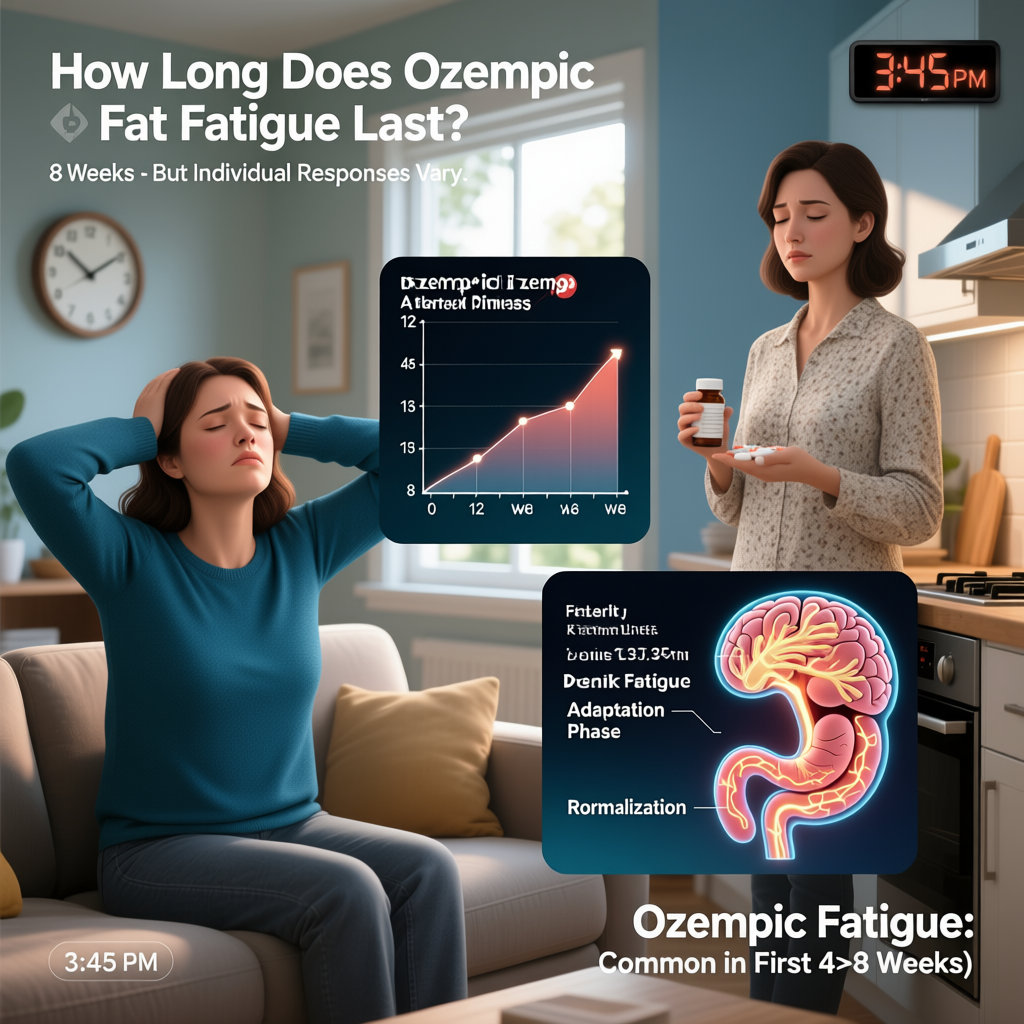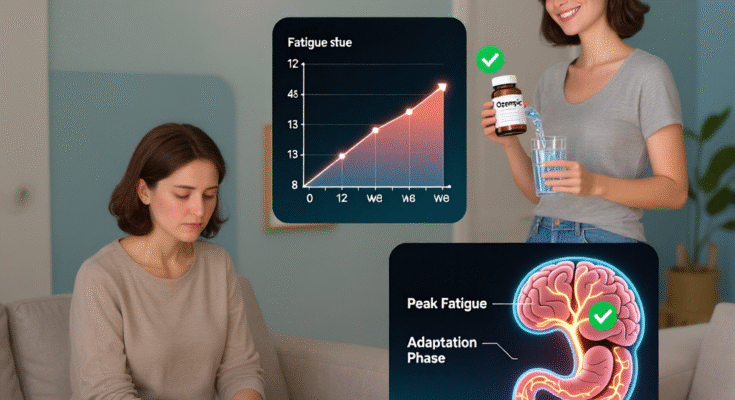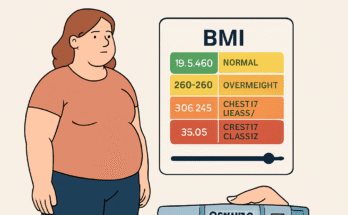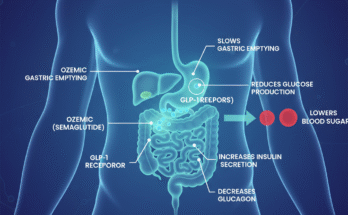Experiencing extreme tiredness first week of starting Ozempic can be alarming for many patients. If you’re wondering when does Ozempic fatigue go away, you’re not alone. Thousands of people taking this popular GLP-1 receptor agonist report energy-related concerns during their treatment journey. Understanding the semaglutide tiredness timeline and knowing whether Ozempic exhaustion is temporary or permanent can help you navigate this common side effect with confidence.
What Causes Fatigue on Ozempic?

Before exploring Ozempic side effects duration, it’s essential to understand why does Ozempic cause fatigue in the first place. Semaglutide, the active ingredient in Ozempic, works by mimicking the GLP-1 hormone that regulates blood sugar and appetite. This medication triggers several physiological changes that can contribute to feelings of exhaustion and low energy.
The primary mechanisms behind diabetes medication exhaustion include:
Caloric Restriction Effects: Ozempic significantly reduces appetite, often leading to decreased food intake. When your body receives fewer calories than it’s accustomed to, fatigue naturally follows. This reduced energy intake means less fuel for daily activities, which can manifest as persistent tiredness.
Metabolic Adjustments: As your body adapts to improved insulin sensitivity and altered glucose metabolism, it undergoes substantial metabolic changes. These adjustments require energy and can temporarily drain your resources, contributing to the overall feeling of exhaustion.
Gastrointestinal Symptoms: Nausea, which affects many patients during the Ozempic adjustment period symptoms, can prevent adequate nutrition intake. Poor nutritional absorption compounds energy depletion, creating a cycle that perpetuates fatigue.
Sleep Disruption: Some patients report sleeping more on Ozempic, while others experience disrupted sleep patterns. Both scenarios can affect energy levels throughout the day and contribute to brain fog and fatigue.
Ozempic Fatigue Timeline: What to Expect
Understanding the typical semaglutide tiredness timeline helps set realistic expectations for your treatment journey. The experience varies among individuals, but general patterns emerge from clinical studies and patient reports.
First Month on Ozempic Side Effects
The initial weeks present the most challenging period for many patients. During this time, you might experience:
- Week 1-2: Low energy after Ozempic injection is most pronounced during the first two weeks. Your body is encountering this medication for the first time, and the dramatic appetite suppression can lead to inadequate calorie consumption. Many patients describe feeling unusually drained during this period.
- Week 3-4: As the first month progresses, some improvement typically occurs. Your body begins adapting to the medication, though fatigue may still be noticeable. This is when establishing healthy eating patterns becomes crucial for energy management.
Beyond the First Month
For most people wondering does Ozempic fatigue improve over time, the answer is encouraging. Clinical observations suggest:
- Months 2-3: Significant improvement in energy levels occurs for many patients. The body’s adaptation to the medication progresses, and most people develop strategies to maintain adequate nutrition despite reduced appetite.
- Months 4-6: By this point, the majority of patients report Ozempic energy levels recovery approaching their baseline. The adjustment period has largely concluded, and fatigue becomes less prominent or resolves entirely.
Is Ozempic Exhaustion Temporary or Permanent?

This question weighs heavily on the minds of many patients. Based on clinical studies and extensive patient experiences shared on platforms like Ozempic fatigue Reddit communities, the exhaustion is temporary for most individuals.
Research indicates that fatigue typically peaks during the first 4-8 weeks of treatment and gradually diminishes thereafter. However, several factors influence individual experiences:
Dose-Related Patterns: Some patients notice Ozempic dose increase fatigue worse temporarily when their dosage is adjusted upward. Each dose escalation may trigger a brief return of tiredness as the body readjusts, though typically less severe than initial symptoms.
Individual Variability: While most people experience resolution of fatigue within 2-4 months, some individuals require longer adaptation periods. A small percentage may continue experiencing mild fatigue throughout treatment.
Underlying Health Factors: Pre-existing conditions, nutritional deficiencies, or other medications can prolong or intensify fatigue symptoms.
Managing Tiredness on Ozempic: Practical Solutions
Successfully navigating the fatigue associated with GLP-1 receptor agonists requires a multifaceted approach. Here are evidence-based strategies for how to reduce Ozempic fatigue:
Nutritional Optimization
Despite reduced appetite, maintaining adequate nutrition is paramount:
Prioritize Nutrient Density: Focus on foods that pack maximum nutrition into smaller portions. Lean proteins, complex carbohydrates, healthy fats, and colorful vegetables should form the foundation of your diet. The best diet for Ozempic side effects emphasizes quality over quantity.
Eat Small, Frequent Meals: Instead of forcing three large meals, try 5-6 smaller eating occasions throughout the day. This approach helps maintain steady blood sugar levels and provides consistent energy.
Stay Hydrated: Dehydration exacerbates fatigue. Aim for at least 8-10 glasses of water daily, adjusting based on activity level and climate.
Supplements for Ozempic Tiredness
While whole foods should be your primary nutrition source, certain supplements may help combat fatigue:
B-Complex Vitamins: B vitamins play crucial roles in energy metabolism. Many patients benefit from a high-quality B-complex supplement, particularly if food intake is significantly reduced.
Iron: If blood tests reveal deficiency, iron supplementation under medical supervision can dramatically improve energy levels. Iron is essential for oxygen transport throughout the body.
Vitamin D: This vitamin influences energy levels and mood. Many people are deficient, and supplementation may help alleviate tiredness.
Magnesium: This mineral supports hundreds of biochemical reactions in the body, including energy production. Magnesium deficiency can manifest as fatigue and weakness.
Always consult your healthcare provider before starting any supplement regimen, as they can assess your specific needs and potential interactions with Ozempic.
Lifestyle Modifications
Beyond nutrition and supplements, lifestyle adjustments support energy recovery:
Optimize Sleep Quality: Establish consistent sleep schedules, create a relaxing bedtime routine, and ensure your sleep environment promotes restful sleep. If you’re sleeping more on Ozempic but still feel tired, focus on sleep quality rather than just quantity.
Incorporate Gentle Exercise: While intense workouts may feel overwhelming initially, light activities like walking, stretching, or gentle yoga can boost energy levels. Start slowly and gradually increase intensity as your energy improves.
Stress Management: Chronic stress depletes energy reserves. Practice relaxation techniques such as meditation, deep breathing, or mindfulness to support your body’s recovery.
Strategic Rest: Listen to your body’s signals. When fatigue strikes, allow yourself appropriate rest periods rather than pushing through exhaustion.
Ozempic Fatigue Treatment Options: Medical Interventions
If self-management strategies prove insufficient, discuss these medical approaches with your healthcare provider:
Dosage Adjustments: Your doctor might recommend slower dose escalation or temporarily reducing your dose to minimize side effects while maintaining therapeutic benefits.
Timing Modifications: Adjusting when you take your injection might help some patients manage fatigue better.
Medication Review: Evaluating other medications you’re taking can identify potential interactions or compounds that might worsen fatigue.
Nutritional Counseling: Working with a registered dietitian experienced in GLP-1 medications can provide personalized strategies for maintaining energy while on Ozempic.
Comparing GLP-1 Medications: Fatigue Profiles
Understanding how different medications in this class affect energy can inform treatment decisions:
Wegovy Fatigue Duration
Wegovy contains the same active ingredient as Ozempic (semaglutide) but at higher doses for weight management. The Wegovy fatigue duration typically mirrors Ozempic experiences, with most patients reporting improvement within 2-4 months. However, higher doses may produce more pronounced initial fatigue.
Mounjaro Tiredness vs Ozempic
Mounjaro (tirzepatide) is a dual GIP/GLP-1 receptor agonist. When comparing Mounjaro tiredness vs Ozempic, patient reports suggest similar fatigue patterns, though some individuals find one medication more tolerable than the other. The choice between these medications should consider multiple factors beyond fatigue alone.
Ozempic vs Metformin Side Effects
Metformin, another common diabetes medication, typically causes fewer energy-related side effects initially. However, long-term metformin use can affect vitamin B12 absorption, potentially leading to fatigue over time. The Ozempic vs Metformin side effects profile differs significantly, with Ozempic causing more acute but often temporary fatigue.
Clinical Studies on Ozempic Tiredness
While patient experiences provide valuable insights, clinical studies Ozempic tiredness offer scientific validation. Research demonstrates:
- Fatigue is reported as a side effect in approximately 5-15% of patients in clinical trials, though real-world rates may be higher
- Most adverse effects, including fatigue, decrease in frequency and intensity after the first several weeks of treatment
- Discontinuation rates due to fatigue alone remain relatively low, suggesting most patients find the symptom manageable
Doctor Recommendations for Ozempic Energy Loss
Healthcare providers typically advise patients experiencing significant energy loss to:
- Maintain Communication: Report severe or persistent fatigue to your doctor promptly
- Monitor Nutrition: Keep a food diary to ensure adequate calorie and nutrient intake
- Screen for Deficiencies: Request blood work to rule out anemia, vitamin deficiencies, or thyroid issues
- Be Patient: Recognize that adjustment periods are normal and temporary for most patients
- Consider Timing: Some doctors recommend taking Ozempic at specific times to minimize daytime fatigue
When to Seek Medical Attention
While fatigue is common, certain symptoms warrant immediate medical evaluation:
- Extreme weakness preventing daily activities
- Persistent dizziness or lightheadedness
- Confusion or significant brain fog
- Shortness of breath with minimal exertion
- Chest pain or heart palpitations
- Symptoms that worsen rather than improve after the first month
These could indicate more serious complications or conditions unrelated to Ozempic requiring prompt attention.
Alternative Perspectives: Community Experiences
Exploring Ozempic fatigue Reddit discussions reveals diverse patient experiences. Common themes include:
- Wide variation in symptom duration and severity
- Success stories of energy recovery after implementing dietary changes
- Strategies that worked for some but not others
- The importance of patience during the adjustment period
- Value of peer support during challenging phases
While community experiences provide comfort and practical tips, remember that individual responses vary, and medical advice should come from qualified healthcare professionals.
Long-Term Outlook: Energy Recovery
For most patients wondering about long-term energy prospects, the outlook is positive. The vast majority of people taking Ozempic report that fatigue resolves within 3-4 months. Once the adjustment period concludes and healthy eating patterns are established, many patients actually report improved energy levels compared to before treatment, likely due to:
- Better blood sugar control
- Weight loss reducing physical strain
- Improved cardiovascular health
- Enhanced metabolic function
- Better sleep quality from weight reduction
Making an Informed Decision
Understanding the complete picture of GLP-1 receptor agonist fatigue helps you make informed treatment decisions. While the initial weeks may be challenging, the temporary nature of fatigue for most patients, combined with the significant health benefits of Ozempic, makes it a worthwhile treatment option for many individuals.
If you’re currently experiencing Ozempic-related fatigue, remember that this side effect typically improves with time. Implement the management strategies outlined above, maintain open communication with your healthcare provider, and be patient with your body’s adjustment process.
Conclusion
The question “when does Ozempic fatigue go away” doesn’t have a one-size-fits-all answer, but the general timeline provides reassurance: most patients experience significant improvement within 2-4 months, with peak fatigue occurring during the first month. Understanding why this medication causes tiredness, implementing practical management strategies, and knowing what to expect throughout your treatment journey empowers you to navigate this temporary challenge successfully.
Whether you’re experiencing extreme tiredness in your first week or wondering if your ongoing exhaustion is normal, remember that you’re not alone in this experience. Millions of patients have successfully navigated the Ozempic adjustment period and emerged with improved health, stable energy levels, and the metabolic benefits this medication provides. With proper management, patience, and medical guidance, you can overcome fatigue and fully benefit from your treatment.

James Rowen is a certified medical writer and healthcare researcher specializing in endocrinology and metabolic health. With over a decade of experience analyzing weight management therapies, James has developed deep expertise in GLP-1 receptor agonists, including Ozempic.




